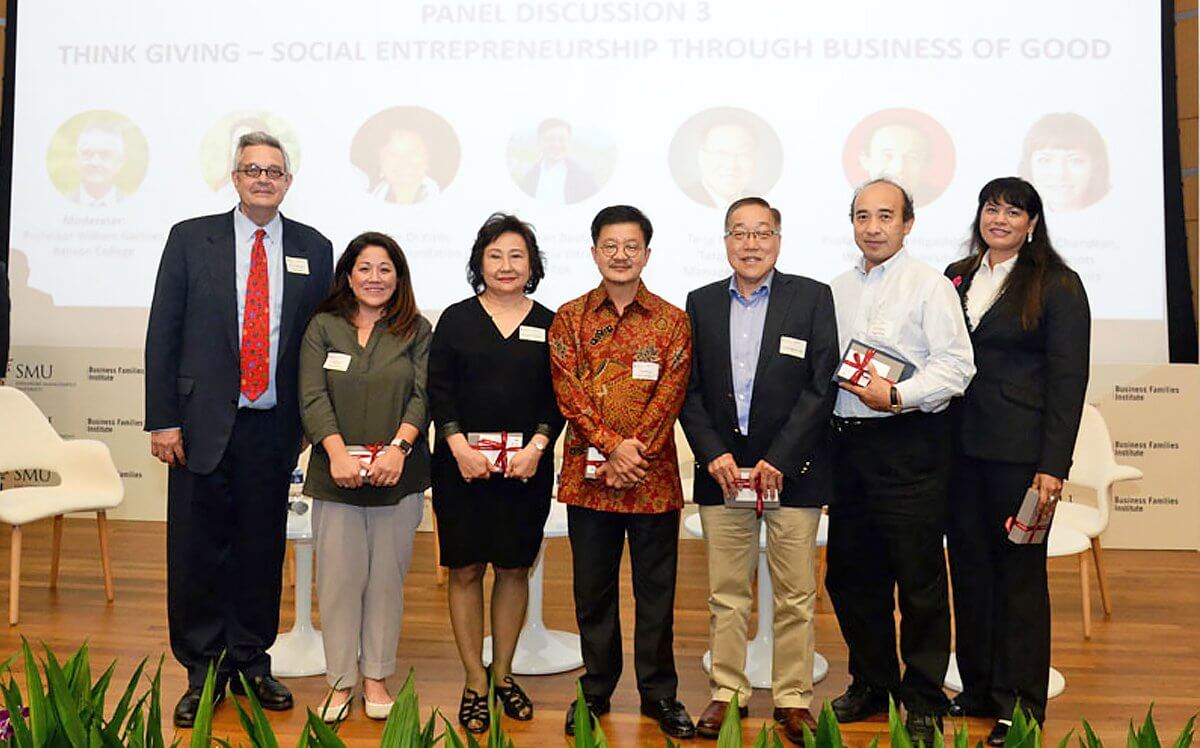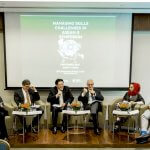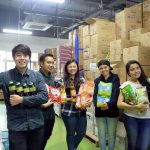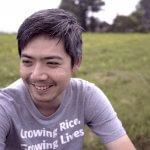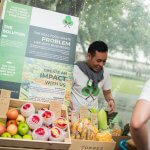By the SMU Social Media Team
Gone are the days when paying lip service to corporate social responsibility through photo ops of staff visiting a nursing home are enough for a company to contribute to the triple bottomline. Instead, the real champions of change develop and adopt ways to build a sustainable future for their businesses and the community. In fact, the leading proponents of social entrepreneurship are owners of family businesses, inspired to build an organisation that reflect their family values.
At the 5th Anniversary Conference of SMU’s Business Families Institute, which took place last July, leaders of various businesses shared their learnings and best practices in the panel discussion, Think Giving: Social Entrepreneurship through Business of Good.
The panel included: Deborah Kyaw Thaung, group executive director of diversified Myanmar enterprise KT Group; Dr Lee Oi Kum, founder of the Houde Foundation in Malaysia and director at Taiko Group; Tandean Rustandy, CEO of Indonesian tile manufacturer PT Arwana Citramulia Tbk; Teng Ngiek Lian, CEO of Target Asset Management and founder of the Singapore-based Silent Foundation; Sharon Chandran, CEO of Footprints Investments and chairman of Filipino coconut supplier and producer Franklin Baker; and Professor Hiro Higashide from the Graduate School of Commerce, Waseda University.
The various business owners all come from different industries, ranging from natural resources to finance, but they all shared a common ambition: leaving a legacy that transcends building a big inheritance for their descendants. Instead, they leverage upon their personal experience and reach to build a business of good.
Breaking the poverty cycle
Tandean Rustandy, for example, decided to take the road less travelled. Instead of following the footsteps of many other Indonesia business owners by mining the natural resources of his country, he went into the business of manufacturing ceramic tiles.
“Most Indonesians get into natural resources because it is an easy business, with easy money,” says Mr Rustandy, who came from a humble background and had to work extremely hard to make his way to college.
“Ceramics was not easy. I started my business in the rural areas, hiring only the uneducated—those who were not needed by society, a lot of whom were criminals.”
Rather than locating his factories at accessible areas, he deliberately targeted zones that had no infrastructure and were undeveloped. This, in turn, provided jobs for the underprivileged residents of rural communities, not just those who could already afford to live in a big city. However, this also meant that Mr Rustandy had to invest heavily into infrastructure and machinery that were easy to operate instead of relying solely on workers with the right skills and education.
“My calling came from the fact that I come from a humble family and managed to get an education in the US,” says Mr Rustandy. “Even if I can’t help my employees go to school, I can help their future generations.”
“I already have the best-listed company—that’s not where I derive my joy. The joy comes from looking at workers who were ex-criminals with kids who graduate from the top universities, and return to work for my company. That’s the joy.”
Arwana Ceramics 2017 anniversary event with employees
Beyond dollars and cents
Similarly, Teng Ngiek Lian—whose boutique asset management firm manages about US$1 billion in assets—was not content with just “contributing to the GDP of the world, which everyone is doing”.
“I want to leave a legacy to my children, to my son who has been running my business for the past 15 years,” says Mr Teng. “I want him to help me redistribute the GDP.”
Mr Teng started Target Asset Management in 1996. In 2010, he went on to establish the Silent Foundation to support environment and wildlife causes, as well as offer financial assistance to children in need. He has personally donated $50 million to the endowment fund of the Foundation.
“All this training as a fund manager makes a difference to how I measure impact through my work in the Foundation—to help people who can’t make money and the sectors that are overlooked,” adds Mr Teng.
“I had to explain to my children and wife [that] we are so lucky—it’s partly luck and the help of others along the way. All the things we need, we have; all the things we don’t have, we don’t need. Let’s give back.”
This attitude of giving is also the underlying ethos for Dr Lee Oi Kum, who works with Ashoka—an international non-profit organisation that promotes social entrepreneurship—to improve the living conditions of plantation workers in Malaysia.
“In the past generations, our family would send money back to our relatives and our home town in China, so this attitude of giving is in already in our DNA,” says Dr Lee.
The medical doctor is a third-generation Hakka Chinese who heads the Taiko Group, which had its roots in industries like mining and plantations, to, more recently, real estate development and fertilisers. She is also working together with owners of other Malaysian plantations to join forces in helping workers receive a better quality of life for themselves and their families.
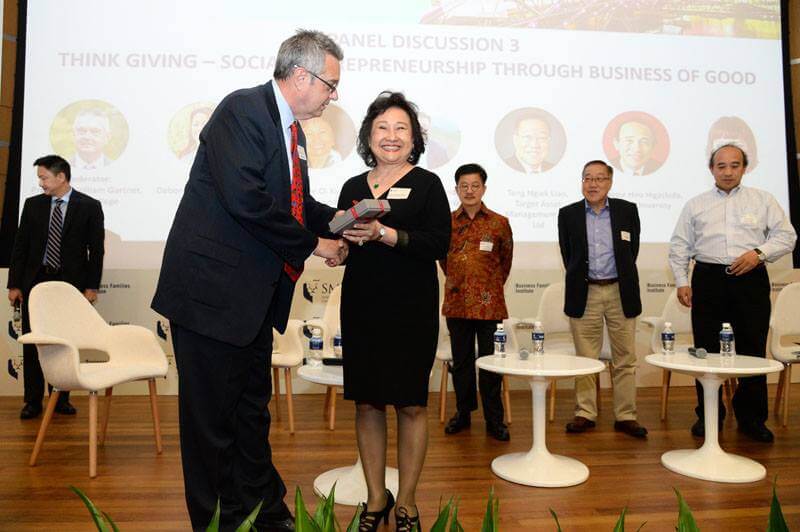
Growing social responsibility
Improving the living standards of plantation workers is also a key cause for Sharon Chandran, whose company contributes to the opening of 1.4 million coconuts a day in the Philippines.
“When you have a company like this that is dependent on so many people, one of the values that I hold dear is helping to protect the people who grow the world’s food,” says Ms Chandran.
“My biggest take is that everybody who works for the company becomes my family. I have 12,500 people in my family in the Philippines and I feel it is my family’s responsibility to help them out.”
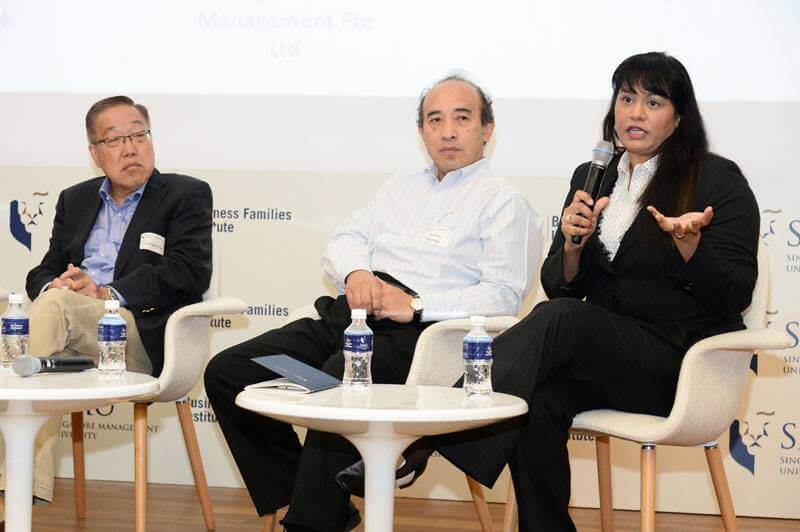
One of Ms Chandran’s initiatives is a partnership with bakery chain Red Ribbon to sell macaroons made from residual coconut powder that are a byproduct of coconut production. In the past, the coconut powder was sold very cheaply as pig feed, which was not very profitable. As such, the factories would give the powder to workers who would make them into macaroons. That gave rise to the idea for the partnership, with the profits made from the sale of Red Ribbon macaroons going to the building of schools. She also works with farmers to achieve organic certification for their produce, which will elevate the value of their products.
As Ms Thaung says, “We have a huge responsibility in this current global environment, and I was privileged enough to learn from my father and grandfather that it’s not about being the top three per cent, but creating a lasting impact through our businesses.
“We want to create opportunities for the masses in our country, and we are looking constantly on how we can do this in an innovative way.”

